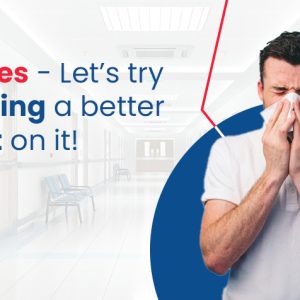Respiratory allergies are not always deadly but they can cause discomfort. Even a mundane task feels like a struggle when you have sneezing fits and a runny nose. Respiratory allergies spike during fall but that doesn’t mean that you are safe from allergens in other seasons. Perennial allergens like house dust mites, animals, molds, etc. can get you any time of the year. Realistically, allergens are inevitable but you can learn how to get rid of a respiratory allergy.
Broadly, respiratory allergy treatment is simple yet hard to manage. All you have to do is stay away from the allergen. It is a walk in the park if you know your allergies but the real problem arises when you have no idea about the allergen. That’s when you need a diagnosis and treatment.
How To Avoid Allergens?
Prevention is better than cure. In case of respiratory allergies, you should avoid the allergens as much as you can. Here are some ways to avoid coming in contact with allergens:
- Identify your allergens and take preventive measures. Take a shower and wash your clothes regularly during peak season.
- Keep your windows closed and dust regularly.
- Wash your bedding frequently and use zippered covers for your pillow and mattresses.
- Avoid exposure to animals. Even if you come in contact, make sure that you wash your hands before touching your face.
- If you have pets at home, you should bathe them frequently and keep them away from your bedroom.
- Wear a face mask and sunglasses to prevent allergens from entering your eyes, mouth, or nasal passage.
- Rinse your nasal passage and avoid rubbing your eyes.
Respiratory Allergy Treatment
Besides the obvious rule of “avoid the allergen,” there are three major treatment methods for respiratory allergies. There are tailored treatment plans for children or lactating women but other than that you can treat allergen-specific respiratory allergies using these methods.
Allergen-Specific Immunotherapy
Allergen-specific immunotherapy is a long-term treatment that focuses on reducing the hypersensitivity of the patient to a particular allergen. Gradual vaccination of progressive doses requires regular administration. Thus, making it a consistent expense. However, you will notice a significant reduction in symptoms after the completion of the therapy. It is a long-term treatment that can give you increased tolerance to the allergen for around 8 years.
Traditional Drugs
Traditional drugs are an indispensable form of treatment that makes up for your inability to avoid the allergen entirely. These drugs come in the form of tablets, capsules, solutions, suspensions, etc.
Some of the common medications are:
- Antihistamines
- Decongestants
- Epinephrine
- Corticosteroids, etc.
Note: Diagnosis is still an inevitable part of your treatment process. Instead of taking over-the-counter medications, you should visit a medical professional.
There are several delivery routes for these medications like oral, transmucosal, inhalation, and injection. Doctors prescribe delivery systems like nebulizers, inhalers, nasal sprays, etc. to increase the effectiveness of the medication.
Nasal sprays and inhalers are the most effective treatment for respiratory allergies.
Read Also: The Benefits of Tomato Juice
Anti-IgE Biological Agents
Anti-IgE is a recently introduced biology therapy that has been showing promising results. In this procedure, monoclonal anti-IgE antibodies are injected into your body under medical supervision. Ideally, it is injected as a countermeasure at the early symptoms of allergic rhinitis to prevent it from turning into allergic asthma.
As of now. Omalizumab is the only approved monoclonal antibody that counteracts the development of the disease. It is an expensive form of treatment but it is showing promise as an allergic rhinitis treatment.
Conclusion
You can easily get rid of respiratory allergies if they are temporary. All you have to do is avoid contact with the allergen and the symptoms will subside on their own. The problem arises when you are frequently facing respiratory allergies irrespective of season or environment. That is when you need a professional diagnosis to identify the allergen and take measures accordingly. As long as you take safety measures and follow medical guidelines, you will be able to counter any respiratory allergy out there.


